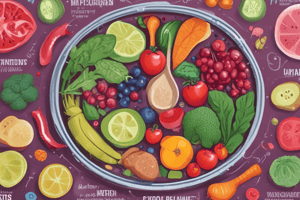Podcast
Questions and Answers
Which type of macronutrient is primarily responsible for providing quick energy?
Which type of macronutrient is primarily responsible for providing quick energy?
- Proteins
- Simple carbohydrates (correct)
- Fat
- Complex carbohydrates
Which of the following is a characteristic of saturated fats?
Which of the following is a characteristic of saturated fats?
- Contains no essential fatty acids
- Usually found in plant oils
- Typically liquid at room temperature
- Typically solid at room temperature (correct)
What is the primary purpose of dietary guidelines?
What is the primary purpose of dietary guidelines?
- Eliminate all fats from the diet
- Encourage restrictive eating habits for weight loss
- Focus solely on macronutrient intake
- Promote a balanced diet and portion control (correct)
Which micronutrient is considered fat-soluble?
Which micronutrient is considered fat-soluble?
What type of diet focuses primarily on reducing carbohydrate intake?
What type of diet focuses primarily on reducing carbohydrate intake?
Which mineral is categorized as a trace mineral?
Which mineral is categorized as a trace mineral?
What aspect of food labels provides details on the quantity of ingredients?
What aspect of food labels provides details on the quantity of ingredients?
How can nutrition impact mental well-being?
How can nutrition impact mental well-being?
Flashcards are hidden until you start studying
Study Notes
Food and Nutrition
Basic Concepts
- Food: Any substance consumed to provide nutritional support.
- Nutrition: The science of how food affects the body, involving the processes of ingestion, digestion, absorption, metabolism, and excretion.
Nutrients
-
Macronutrients
- Carbohydrates: Main source of energy; includes sugars, starches, and fiber.
- Simple carbs: Quick energy (e.g., glucose, fructose).
- Complex carbs: Longer-lasting energy (e.g., whole grains, legumes).
- Proteins: Essential for growth and repair; made of amino acids.
- Complete proteins: Contain all essential amino acids (e.g., meat, eggs, dairy).
- Incomplete proteins: Missing one or more essential amino acids (e.g., legumes, nuts).
- Fats: Provide energy, support cell growth, and protect organs.
- Saturated fats: Typically solid at room temperature (e.g., butter).
- Unsaturated fats: Typically liquid; includes monounsaturated and polyunsaturated fats (e.g., olive oil, fish).
- Carbohydrates: Main source of energy; includes sugars, starches, and fiber.
-
Micronutrients
- Vitamins: Organic compounds necessary for various bodily functions.
- Fat-soluble: A, D, E, K.
- Water-soluble: B-complex, C.
- Minerals: Inorganic elements that support bodily functions.
- Major minerals: Calcium, potassium, sodium.
- Trace minerals: Iron, zinc, selenium.
- Vitamins: Organic compounds necessary for various bodily functions.
Dietary Guidelines
- Balanced Diet: Includes a variety of foods from all food groups to meet nutritional requirements.
- Portion Control: Importance of serving sizes to prevent overeating.
- Hydration: Essential for maintaining bodily functions; water is crucial.
Special Diets
- Vegetarian/Vegan: Plant-based diets; may require supplementation for nutrients like B12 and iron.
- Low-Carb: Focuses on reducing carbohydrate intake; often used for weight loss.
- Ketogenic: Very low in carbohydrates, high in fats; aims to induce ketosis.
Food Labels
- Nutrition Facts: Provides information on calories, macronutrients, and micronutrients.
- Ingredients List: Details all components in the product, listed by quantity.
Food Safety
- Hygiene: Importance of cleanliness in food preparation to prevent foodborne illnesses.
- Storage: Proper storing techniques to maintain food quality and safety.
Impact of Nutrition
- Health: Direct correlation between nutrition and health outcomes (e.g., obesity, heart disease).
- Mental Well-being: Nutrition can influence mood and cognitive function.
Key Takeaways
- Emphasize whole, minimally processed foods.
- Monitor and balance macronutrient intake according to individual needs.
- Stay informed about food safety practices.
Basic Concepts
- Food provides nutritional support necessary for bodily functions and overall health.
- Nutrition encompasses the processes of ingestion, digestion, absorption, metabolism, and excretion that influence health.
Nutrients
-
Macronutrients provide energy and include:
- Carbohydrates: Primary energy source, divided into simple (quick energy) and complex (sustained energy) carbohydrates.
- Proteins: Key for tissue growth and repair; can be complete (all essential amino acids) or incomplete (lacking some essential amino acids).
- Fats: Vital for energy, cell support, and organ protection; divided into saturated (solid at room temperature) and unsaturated (liquid, includes healthy fats like oils and fish).
-
Micronutrients are essential for various bodily functions:
- Vitamins: Organic compounds needed for health; categorized into fat-soluble (A, D, E, K) and water-soluble (B-complex, C).
- Minerals: Inorganic elements supporting bodily processes; consist of major (e.g., calcium, potassium) and trace minerals (e.g., iron, zinc).
Dietary Guidelines
- A balanced diet requires a variety of foods from all food groups to ensure adequate nutrition.
- Portion control is essential in managing serving sizes to avoid overeating.
- Adequate hydration, primarily through water intake, is crucial for physical and cognitive functions.
Special Diets
- Vegetarian/Vegan diets: Focused on plant-based foods, often necessitating supplementation for nutrients like Vitamin B12 and iron.
- Low-Carb diet: Reduces carbohydrate intake, often associated with weight loss strategies.
- Ketogenic diet: Extremely low in carbohydrates, high in fats, designed to induce a metabolic state known as ketosis.
Food Labels
- Nutrition facts on packaging detail calories, macronutrients, and micronutrients to aid informed food choices.
- The ingredients list outlines all components in a product, arranged by quantity.
Food Safety
- Hygiene during food preparation is critical to prevent foodborne illnesses and ensure food safety.
- Proper storage techniques are vital to maintain food quality and prevent spoilage.
Impact of Nutrition
- Nutrition plays a significant role in health outcomes, influencing conditions such as obesity and heart disease.
- Dietary choices can also affect mental well-being, influencing mood and cognitive performance.
Key Takeaways
- Prioritize whole, minimally processed foods.
- Tailor macronutrient intake according to individual dietary needs.
- Stay knowledgeable about food safety measures to enhance health.
Studying That Suits You
Use AI to generate personalized quizzes and flashcards to suit your learning preferences.




